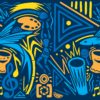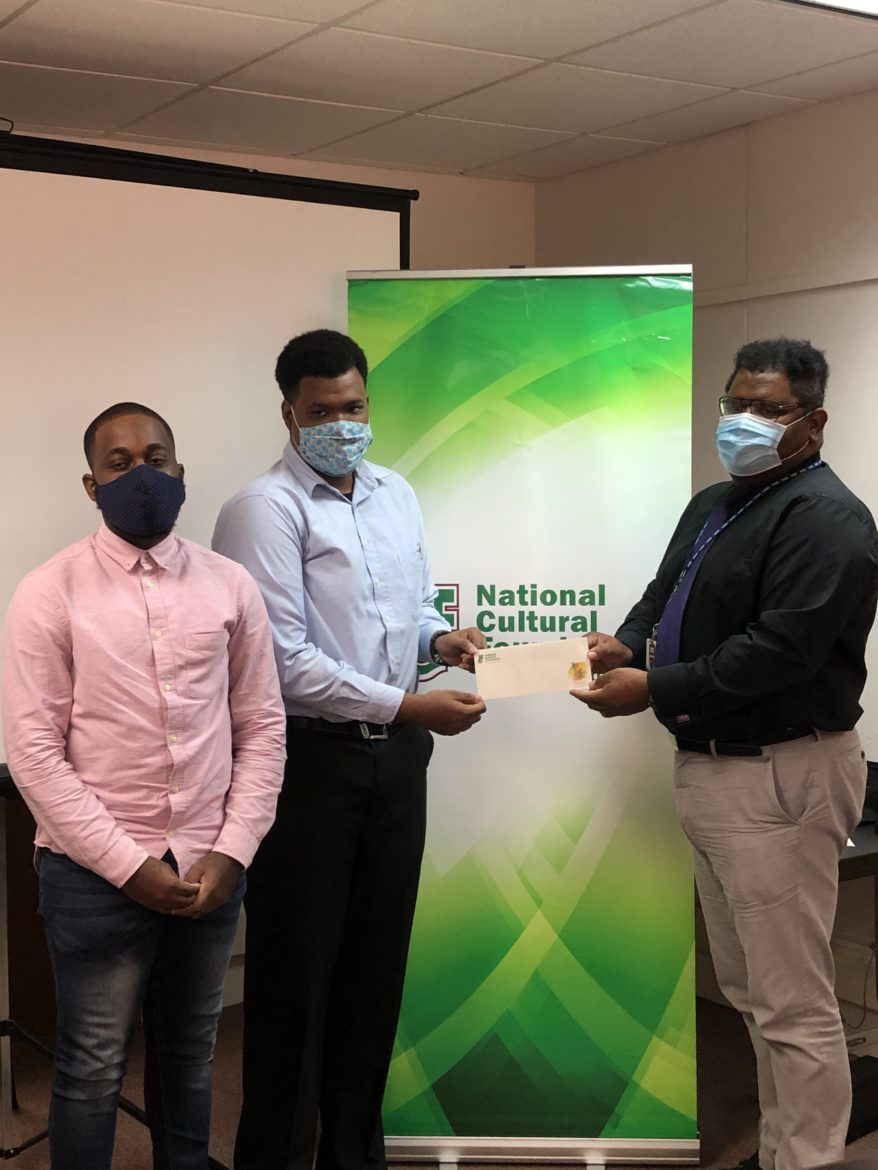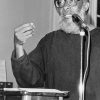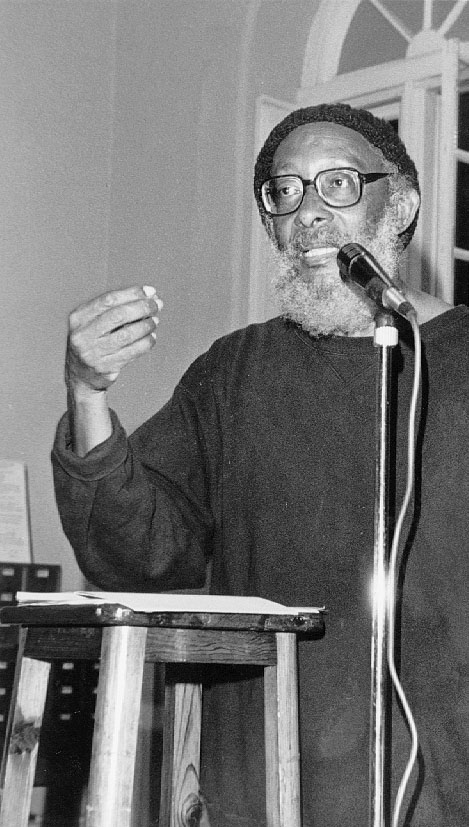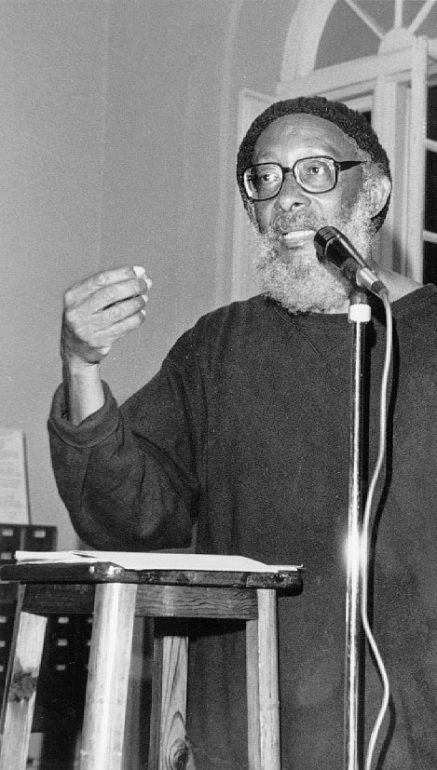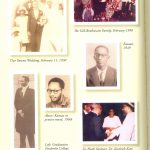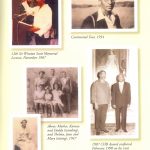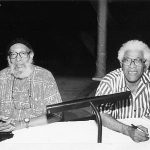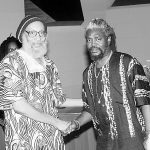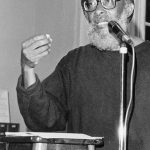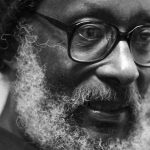
Professor, The Honourable Kamau Brathwaite was born Lawson Edward Brathwaite in Bridgetown, as the son of Hilton Brathwaite, a warehouse clerk and the former Beryl Gill. He attended Harrison College, an elite school and then went with a Barbados Scholarship to England, where he studied history at Pembroke College, Cambridge. From 1950 he started to publish short stories, literary criticism and poetry in the West Indian magazine Bim, edited by Frank Collymore.
After graduating with honours in 1953, Brathwaite studied fir a year for a teacher’s certificate. In England he felt an outsider but entered the British colonial service and left in1955 for the Gold Coast (now Ghana), where he worked at the textbook department of the Ministry of Education. “I want to submit that the desire (even the need) to migrate is at the heart of West Indian sensibility,” wrote Brathwaite in 1957 in Bim, “whether that migration is in fact or by metaphor.”
In 1957 a new nation, Ghana, was born and became a model for other colonies struggling for independence. During these years Brathwaite familiarized himself with traditional verse and pre-colonial African myths, which were considered an essential part on building a new Ghanaian cultural identity. Brathwaite was influenced especially by the work of Kwabena Nkeita, the director of Ghana Institute for Study of African Culture. Brathwaite established a children’s theatre and wrote children’s books and plays, of which Odale’s Choice was later produced by the Trinidad Theatre Workshop.
Brathwaite married in 1960 Doris Welcome, they had one son. He returned to the West Indies in 1962 and was appointed a tutor in the department of Extra-Mural Studies of the University of the West Indies in St. Lucia. Next year he moved to the Mona campus of the university, in Kingston, Jamaica. He produced programs for the Windward Island Broadcasting Service, was the founding secretary of the Caribbean Artists’ Movement in 1966 and in 1970 started to edit its magazine Savacou. Deeply conscious of his social role both as poet and professional historian, he started after 1976 to use the culturally divided first names Edward Kamau.
Brathwaite received his Ph.D. from the University of Sussex in 1968. His dissertation was titled The Development of Creole Society in Jamaica 1770-1820 (1971). The years were to Brathwaite of crucial importance for the direction and limitation of Jamaican Creole identity. To heal the traumas of colonialism, he has suggested that the denigrated Creole language should be introduced into the education system. Brathwaite’s other notable scholar works include Jazz and the West Indian Novel, published in Bim in 1967 and The Folk Culture of Jamaican Slaves (1969).
In 1983 Brathwaite was appointed professor of social and cultural history at the University of the West Indies, where he worked until 1991. After retiring he spent some time as a visiting professor in America and in 1993 he became professor of comparative literature at New York University. Among Brathwaite’s several awards are the Cholmondely Award in 1970, Guggenheim and Fulbright fellowships in 1983 and the Neustadt Prize from 1994.
In his poetry Brathwaite has infused European and African influences. He combines spoken word with modernist techniques and new spellings and uses rhythms from jazz and folk music. But in Brathwaite, play with words and linguistic inventions are not a manifestation of self-absorbed individualism or postmodern ironic attitude toward aesthetic practices. His poetry is a part of the collective search of Caribbean identity and racial wholeness. Feelings of rootlessness emerge often from Brathwaite’s poems and in an interview he has confessed that his travels have given him a sense of movement and restlessness. Poet, playwright critic and historian, has written several works that deal with the complex Caribbean heritage and its African roots. Brathwaite has been a major proponent of the use of “nation language”, which is closely allied to the African experience in the Caribbean. It is not dialect or Creole merely, but as Brathwaite had defined “the kind of English spoken by the people who were brought to the Caribbean, not the official English now, but the language of slaves and labourers, the servants who were brought in”.
Never seen
a man
travel more
seen more lands
than this poor
path-
less harbourless
spade.
(from Rights of Passage, 1967)
Brathwaite made his breakthrough with the dazzling trilogy Rights of Passage (1967), written while he taught at the University if the West Indies, Masks (1968) and Islands (1969), reissued in one volume as The Arrivants: A New World Trilogy (1973). Its central theme is a Dantesque spiritual journey in which the Paradise is lost, but eventually it leads to a recovery and rebirth into the knowledge of the past.
In Black + Blues (1976), which earned Brathwaite a prize at the Cuban Casa de las Americas poetry competition, he plunged into the language and experience of Rastafarian and urban slum subculture. The Zea Mexican Diary (1993) was a tribute to the poet’s wife, Doris, written in 1986 when Brathwaite learned that she was dying of cancer. It was composed in “nation language” of Jamaica and Caribbean. Mother Poem (1977), Sun Poems (1982) and X/Self (1987) form a family trilogy with autobiographical elements, which tries to give a total picture of the Caribbean experience. The trilogy starts with the world of Caribbean women and focuses then on fathers and following generations.
Brathwaite is the 2006 International Winner of the Sixth Annual Griffin Poetry Prize, the richest prize for poetry in the world. His recent volume of poetry, Born to Slow Horses, was the work recognised for the Griffin Poetry Prize. He has received both the Guggenheim and Fulbright Fellowships, to cite only two of many other notable fellowships. Winner of the Neustadt International Prize for Literature, the Bussa Award, the Casa de las Americas Prize and the Charity Randall Prize for Performance and Written Poetry.


